West Midlands plans transition to franchised bus services
- Like
- Digg
- Del
- Tumblr
- VKontakte
- Buffer
- Love This
- Odnoklassniki
- Meneame
- Blogger
- Amazon
- Yahoo Mail
- Gmail
- AOL
- Newsvine
- HackerNews
- Evernote
- MySpace
- Mail.ru
- Viadeo
- Line
- Comments
- Yummly
- SMS
- Viber
- Telegram
- Subscribe
- Skype
- Facebook Messenger
- Kakao
- LiveJournal
- Yammer
- Edgar
- Fintel
- Mix
- Instapaper
- Copy Link
Posted: 21 May 2024 | Intelligent Transport | No comments yet
The West Midlands Combined Authority prepares to overhaul its bus network, citing unsustainable subsidies and proposing a shift to a franchised model by 2025 to enhance service reliability and affordability.


Credit: West Midlands Combined Authority
In recent developments, the West Midlands Combined Authority (WMCA) has disclosed that over £75 million has been allocated to subsidise the region’s bus services over an 18-month period. This substantial financial support has been crucial in preventing potential fare hikes and service reductions that could have impacted thousands of passengers, particularly affecting evening and weekend travel.
Transport for West Midlands (TfWM), a pivotal arm of WMCA, has already commenced discussions with both government officials and bus operators regarding additional funding beyond 2024. The aim is to sustain current service levels and mitigate potential fare increases slated for 2025.
Mayor Richard Parker has expressed concerns over the sustainability of the current system, labelling the bus network as “broken.” He has directed officials to present a detailed proposal to the WMCA Board, outlining plans to transition towards a franchised model by 2025. This shift would empower TfWM to oversee route planning, fare structures and service frequencies, thereby aiming to enhance service reliability and affordability.
Buses serve as the backbone of the region’s transport infrastructure, facilitating approximately five million passenger journeys per week. Despite TfWM covering half of the operational costs, private bus operators retain authority over route decisions, fares and timetables under the existing framework.
TfL and KeolisAmey launch Access DLR trial to enhance accessibility
Looking ahead, the WMCA Board has initiated an evaluation of future strategies, exploring the feasibility and potential benefits of franchising the bus network. This assessment, due for completion by mid-2023, will consider public feedback and operational efficiencies under the proposed model.
Pete Bond, Director of Integrated Network Services for TfWM, said: “This work requested by the Mayor will show if there are improved efficiencies and benefits from franchising, and if we can get better value for money for the taxpayer as well as shape the bus network by using funding in a more coordinated and efficient way. It will also highlight if further customer benefits can be made such as improved ticketing and fares and passenger information as well as further integration with tram and rail services.”
Bus operators have faced mounting financial pressures, exacerbated by escalating fuel costs, maintenance expenditures, and ongoing staffing challenges post-Covid-19. These factors have contributed to a surge in subsidy requirements to ensure continued operational viability.
The forthcoming report to the WMCA Board in July 2024 will outline detailed implementation plans for franchising, encompassing setup costs, operational forecasts, and anticipated service enhancements.
Related topics
Fleet Management & Maintenance, Passenger Experience, Public Transport, Transport Governance & Policy
Related modes
Bus & Coach
Related countries
United Kingdom
Related organisations
Transport for West Midlands (TfWM), West Midlands Combined Authority (WMCA)
Related people
Pete Bond, Richard Parker








